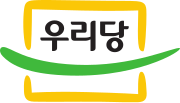
Back Yeollin-uri-Partei German Partido Uri Spanish Parti Uri French ウリ党 Japanese 열린우리당 Korean Mūsų Atviroji partija Lithuanian Uri-partij Dutch Uri-partiet NB Partido Uri Portuguese Уридан Russian
Uri Party 열린우리당 열린우리黨 | |
|---|---|
 Logo of Uri Pary (2006–2007) | |
| President | Roh Moo-hyun |
| Founded | 1 November 2003 |
| Dissolved | 20 August 2007 |
| Split from | Democratic Party Grand National Party People's Party for Reform |
| Merged into | Grand Unified Democratic New Party |
| Headquarters | 133 Yeongdeungpo-dong 6-ga, Yeongdeungpo-gu, Seoul, South Korea |
| Ideology |
|
| Political position | Centre to centre-left[7][8] |
| Colours | Yellow |
| Uri Party | |
| Hangul | |
|---|---|
| Hanja | 열린우리黨 |
| Revised Romanization | Yeollin Uri-dang |
| McCune–Reischauer | Yŏllin Uri-dang |
| This article is part of a series on |
| Liberalism in South Korea |
|---|
 |
The Yeollin Uri Party (Korean: 열린우리당; Hanja: 열린우리黨; RR: Yeollinuridang; MR: Yŏllinuridang; lit. Our Open Party), generally abbreviated to Uri Party (Korean: 우리당; Hanja: 우리黨; RR: Uridang; lit. Our Party), was the ruling social-liberal political party in South Korea from 2003–2007. It had a liberal political ideology in order to support then President Roh Moo-hyun. Chung Sye Kyun was the last leader of the party and twice served as its chairman. In 2007 the party merged the United New Democratic Party to form the Democratic Party. The current-day descendant of the party is the Democratic Party of Korea, but progressives in the party have become members of the Justice Party.
- ^ "S Korea's Uri Party wins election".
- ^ "Change or continuation: Presidential race heats up". The Korea Herald. 22 September 2021. Retrieved 28 September 2021.
The governor has stayed consistent with his political beliefs and core values, which has helped him build a concrete support base since he first joined politics in 2005 as a member of the defunct liberal Uri Party.
- ^ Hae-Won Jun. "Electoral Systems, Political Career Paths and Legislative Behavior: Evidence from South Korea's Mixed-Member System1" (PDF). Cambridge University Press. p. 158.
- ^ 바보 노무현이 말하는 민주주의 - YouTube
- ^ "열린우리당 '친노세력' 다시 뭉치나". The Hankyoreh. 31 October 2005. Retrieved 9 July 2020.
- ^ ""열린우리당, 경제는 우파·정치는 진보·사회는 좌파"" [Uri Party is economically right-wing, political progressive, and socially left-wing.]. OhmyNews (in Korean). 17 September 2004. Retrieved 6 January 2022.
- ^ Jean-Mark Peterson, ed. (2009). Brief History: Brief History of Korea. Infobase Publishing. p. 242. ISBN 9781438127385.
- ^ "Centrist politics in favor among younger Koreans". Korea JoongAng Daily. 19 December 2005. Retrieved 9 July 2020.
Translated into political support, the center-left Uri Party last year was supported by 35 percent of those in their 20s, while the conservative Grand National Party was favored by only about 17 percent of those young adults.
© MMXXIII Rich X Search. We shall prevail. All rights reserved. Rich X Search